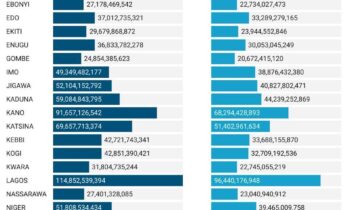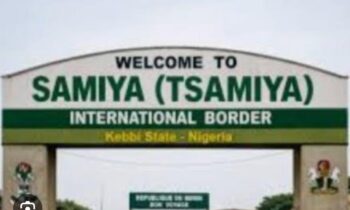
The 36 states in the federation received about N1.51trillion, or 34.5 percent of the total N4.37 trillion shared by the three tiers of the government between January and June, 2023, the second quarter 2023 Federation Account Statutory Revenue Allocations Report has shown.
The report by the Nigerian Extractive Industries Transparency Initiative (NEITI) showed the states received about N817.79 billion from the N2.32 trillion total distributable allocation in the first quarter and N688.2billion of the N2.04trillion allocation in the second quarter.
According to report made available to the press by Obiageli Onuorah, deputy director/Head Communications & Stakeholders’ Management, NEITI, the report showed that a 12 percent decline in the overall allocation in the second quarter resulted in a 15.8% reduction in the share to the states in the first quarter, from N817.8 billion to N688.2 billion.
Despite the decline in the overall allocation, the report noted that the share of the states’ allocations exceeded the federal government’s when the 13 percent derivation revenue was added.
Apart from the share of the statutory allocations, the report said the nine oil-producing states, namely Abia, Akwa Ibom, Anambra, Bayelsa, Delta, Edo, Imo, Ondo and Rivers received additional allocations as their share of the 13 percent derivation revenue to bring their total receipts to about N869.09 billion.
On a year-on-year basis, the report showed that when compared with the corresponding period in 2022, allocations to the State governments from the Federation Account in 2023 grew by about 11.2% to N1.42 trillion from N1.26 trillion.
On a state-by-state basis, the report showed that Delta State received the largest allocation of N102.79 billion among the 36 states in the second quarter, followed by Akwa Ibom and Rivers states, which received N70.01 billion and N69.73 billion respectively. Ekiti, Ebonyi and Nassarawa States received the lowest allocations of N16.95 billion, N16.84 billion and N16.71 billion respectively.
In terms of debt repayment, the report showed that the deduction from Lagos state topped the 36 states’ allocations to service pending debts as a result of foreign loans and contractual obligations such as irrevocable standing payment orders (ISPO) and other liabilities standing against each state.
The report showed that a total deduction of N9 billion from the Lagos State allocation in the second quarter of 2023 was the highest, followed by Delta (N6.76 billion), Ogun (N6.10billion), Kaduna (N5.63billion) and Osun (N5.6billion).
Enugu, Kebbi, Nasarawa, Anambra and Jigawa states recorded the lowest deductions of N1.88billion, N1.51billion, N1.45 billion, N1.29 billion and N1.16 billion respectively.
After all the deductions, the report showed that Delta State’s net allocation of N96.03 billion remained the highest, followed by Rivers (N66.81 billion), Akwa Ibom (N64.81 billion), Lagos (N51.61 billion) and Bayelsa (N51.53 billion).
However, the report identified Plateau, Ogun, Osun as the states whose revenue receipts in the second quarter were negatively impacted the most by the debt deductions.
Plateau State, which occupied the 21st position among the 36 states prior to the debt deduction, dropped to the 31st position, while Ogun moved from the 28th position to 35th and Osun from 32nd position to 36th position.
In terms of the ratio of each state’s deduction from allocation for debt repayment, the report expressed concern over the situation affecting Ogun, Osun and Cross River States, although it said Rivers, Jigawa and Kebbi states showed strong sustainability capacity.
While the debt deductions from most of the states’ allocation left them with significant net take-home, at least two states (Ogun and Osun) debt deductions were above 30 percent, while the deductions from Cross River and Plateau states allocations were 29 percent and 28 percent respectively.
Imo, Ekiti, Gombe, Kaduna and Bauchi recorded deductions that accounted for almost a quarter of their gross allocations, the report said.





